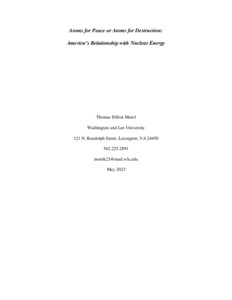| dc.description.abstract | Based on over twenty interviews, we can conclude that public opinion, industries and special interest groups, costs of planning and building a nuclear reactor, and the regulatory framework surrounding nuclear energy each contribute to the U.S.'s relative lack of new nuclear power plants. Despite an increasing concern for global warming, interest in green energy, and new technological innovations, America is not seeing a substantive increase in new nuclear reactors because of wavering public opinion, powerful lobbies and advocacy, antiquated and cumbersome regulations, and soaring planning and construction costs. Each of these factors are important, but in my research, none are as individually crucial as cost. If nuclear energy was cost-competitive, nuclear energy would be a significantly larger player on America's energy stage. But cost is not unrelated to the political environment. With each factor -- NIMBYism, lobbying, the regulatory environment -- costs are added, and an already expensive undertaking becomes increasingly cost-prohibitive. . . . Overall, nuclear power is an important case study in the challenges, if not potential failings, of self-government and materialism. It remains unlikely that we can decrease our consumption of material goods, and one of the clearest solutions to our greenhouse gas issue -- nuclear energy -- remains hindered by a government paralyzed by public perception concerns, an inefficient regulatory framework, and persistently high construction costs. Nuclear energy is therefore an example of a larger political and social issue: democracy, while vital to protecting self-rule, civil rights, and individual liberties, is flawed at advancing effective if unpopular policies. Democracy, however, is not solely to blame. Capitalism typically favors high volume, low cost options. Nuclear energy produces vast quantities of energy but is often cost prohibitive. Should we hope to successfully address greenhouse gas emissions and climate change, we should look to atomic energy as a single-issue case study as to where our nation's political and societal mechanisms fall short. [From Conclusion] | en_US |
| dc.rights | This material is made available for use in research, teaching, and private study, pursuant to U.S. Copyright law. The user assumes full responsibility for any use of the materials, including but not limited to, infringement of copyright and publication rights of reproduced materials. Any materials used should be fully credited with the source. | en_US |
